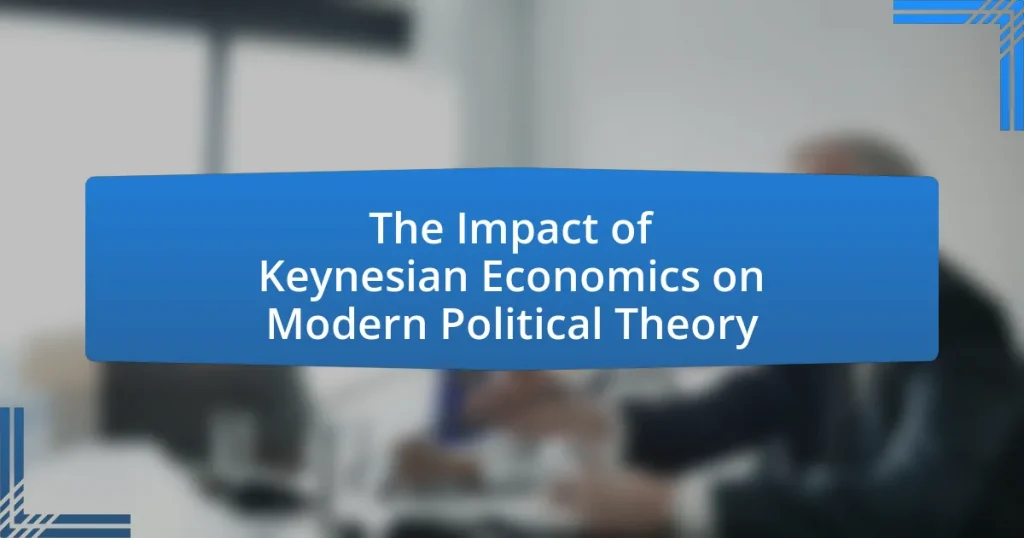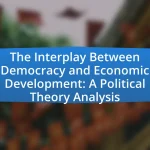Keynesian economics, developed by John Maynard Keynes, has profoundly influenced modern political theory by advocating for government intervention to stabilize economies and reduce unemployment. This article examines the emergence of Keynesian thought during the Great Depression, its foundational principles emphasizing aggregate demand, and its relevance in contemporary political discourse, particularly in relation to social democracy and welfare state development. It also explores the integration of Keynesian principles into modern policymaking, the criticisms of Keynesian economics, and its impact on neoliberal thought, highlighting the ongoing debates surrounding government intervention in economic management. Through historical examples and contemporary applications, the article illustrates the enduring legacy of Keynesian economics in shaping political ideologies and strategies today.
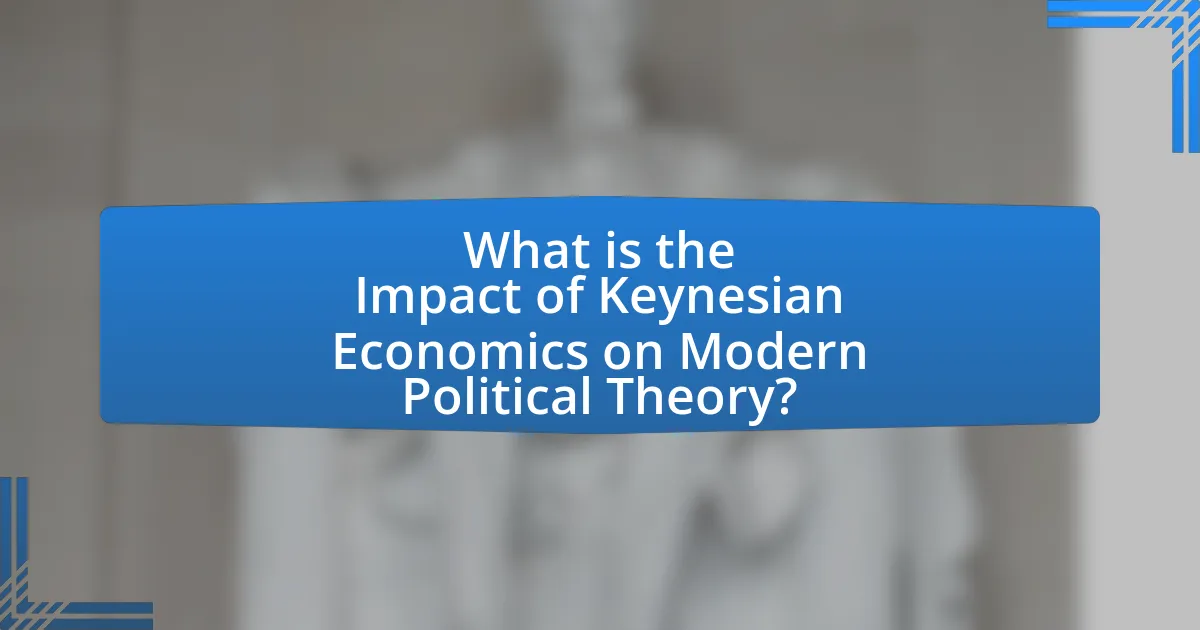
What is the Impact of Keynesian Economics on Modern Political Theory?
Keynesian economics significantly influences modern political theory by advocating for government intervention in the economy to stabilize output and reduce unemployment. This approach reshaped political ideologies, leading to the adoption of welfare state policies and fiscal stimulus measures during economic downturns, as seen in the New Deal in the United States and post-World War II economic policies in Europe. The emphasis on aggregate demand as a driver of economic performance has led political theorists to prioritize economic management and social welfare in policy discussions, reinforcing the role of the state in economic affairs. This shift is evidenced by the widespread acceptance of Keynesian principles in mainstream economic policy, particularly during recessions, where governments implement stimulus packages to boost demand and mitigate the effects of economic crises.
How did Keynesian Economics emerge as a significant influence in political thought?
Keynesian Economics emerged as a significant influence in political thought primarily through its advocacy for government intervention in the economy to mitigate the adverse effects of economic downturns. This approach gained prominence during the Great Depression of the 1930s when traditional economic theories failed to address widespread unemployment and economic stagnation. John Maynard Keynes, in his seminal work “The General Theory of Employment, Interest, and Money” published in 1936, argued that active government policies could stimulate demand and promote economic recovery. His ideas led to the adoption of fiscal policies aimed at increasing public spending and reducing taxes during economic slumps, fundamentally reshaping the role of government in economic management. The success of these policies in various countries during the mid-20th century further solidified Keynesian Economics as a cornerstone of modern political theory, influencing policymakers and economists worldwide.
What are the foundational principles of Keynesian Economics?
The foundational principles of Keynesian Economics include the belief that aggregate demand is the primary driver of economic growth and employment. Keynesian theory posits that during periods of economic downturn, government intervention through fiscal policy, such as increased public spending and tax cuts, is necessary to stimulate demand and pull the economy out of recession. This approach is supported by historical evidence, such as the New Deal policies implemented in the United States during the Great Depression, which aimed to boost demand and reduce unemployment. Additionally, Keynesian Economics emphasizes the importance of consumer confidence and its impact on spending, suggesting that psychological factors can significantly influence economic performance.
How did historical events shape the development of Keynesian thought?
Historical events, particularly the Great Depression of the 1930s, significantly shaped the development of Keynesian thought. John Maynard Keynes proposed that during economic downturns, active government intervention is necessary to stimulate demand and pull economies out of recession, as evidenced in his seminal work, “The General Theory of Employment, Interest, and Money” published in 1936. The widespread unemployment and economic stagnation during the Great Depression highlighted the limitations of classical economic theories, which failed to address the crisis effectively. This led to the adoption of Keynesian principles by governments worldwide, influencing policies that emphasized fiscal stimulus and public spending to promote economic recovery. The success of these policies in the post-World War II era further solidified Keynesian thought as a dominant economic paradigm, demonstrating its relevance in addressing real-world economic challenges.
Why is Keynesian Economics relevant to contemporary political theory?
Keynesian Economics is relevant to contemporary political theory because it provides a framework for understanding government intervention in the economy during periods of recession and unemployment. This economic theory, developed by John Maynard Keynes, emphasizes the role of aggregate demand in influencing economic activity and suggests that active government policies can stabilize economic fluctuations. For instance, during the 2008 financial crisis, many governments adopted Keynesian principles by implementing stimulus packages to boost demand and mitigate economic downturns, demonstrating the theory’s practical application in modern governance. Additionally, the ongoing debates about income inequality and social welfare policies reflect Keynesian ideas, as they advocate for government involvement to promote economic stability and equitable growth.
What are the key tenets of modern political theory influenced by Keynesian ideas?
The key tenets of modern political theory influenced by Keynesian ideas include the emphasis on government intervention in the economy, the importance of aggregate demand in driving economic growth, and the belief in the role of fiscal policy to stabilize economic fluctuations. Keynesian economics posits that during periods of economic downturn, active government spending can mitigate unemployment and stimulate recovery, as evidenced by the New Deal policies implemented in the United States during the Great Depression. Additionally, modern political theory reflects a commitment to social welfare and equity, advocating for policies that address income inequality and provide public goods, which are rooted in Keynesian principles that prioritize collective well-being over individual market outcomes.
How do policymakers integrate Keynesian principles into their strategies?
Policymakers integrate Keynesian principles into their strategies by employing fiscal policies aimed at stimulating economic demand during downturns. This approach includes increasing government spending and cutting taxes to boost consumer and business spending, thereby reducing unemployment and fostering economic growth. Historical evidence, such as the implementation of the New Deal in the 1930s, demonstrates the effectiveness of these strategies in combating economic recessions. Additionally, during the 2008 financial crisis, many governments adopted Keynesian measures, resulting in significant economic recovery, which further validates the integration of these principles into modern economic policy.
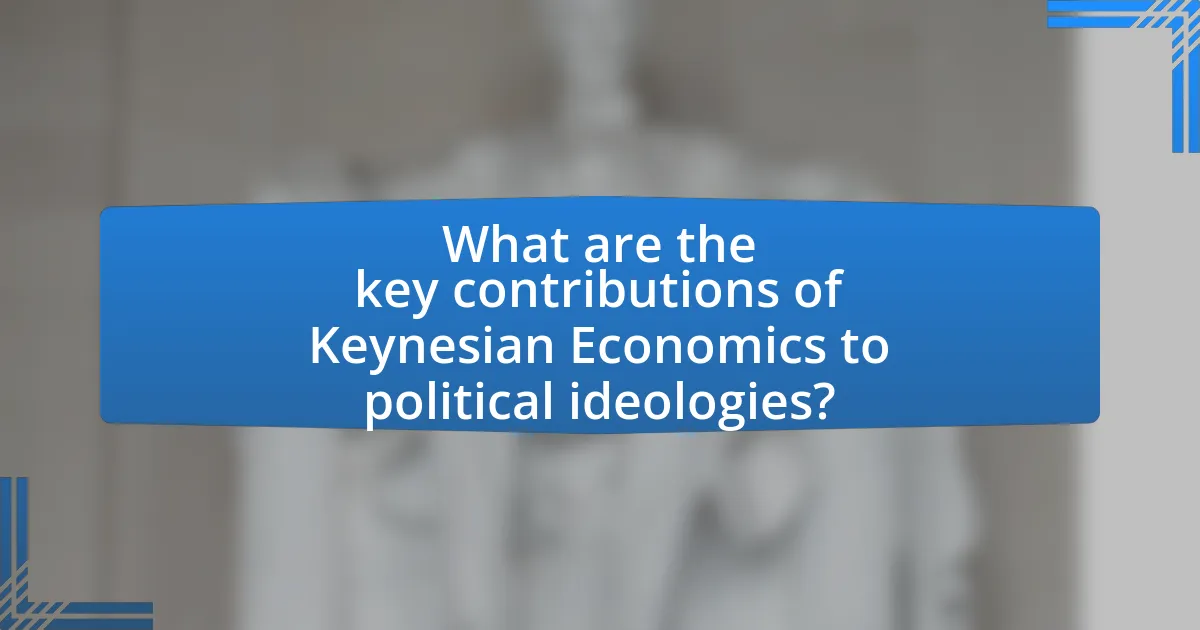
What are the key contributions of Keynesian Economics to political ideologies?
Keynesian Economics significantly contributes to political ideologies by advocating for government intervention in the economy to stabilize output and reduce unemployment. This approach challenges classical economic theories that favor minimal government involvement, promoting the idea that active fiscal policies, such as increased public spending and tax adjustments, can mitigate economic downturns. Historical evidence from the Great Depression illustrates how Keynesian policies, implemented by governments to stimulate demand, led to recovery and reshaped political thought towards favoring mixed economies. Consequently, Keynesian Economics has influenced social democratic ideologies, emphasizing welfare state principles and economic regulation to achieve social equity and stability.
How has Keynesian Economics influenced social democracy?
Keynesian Economics has significantly influenced social democracy by advocating for government intervention in the economy to promote social welfare and reduce inequality. This economic theory, developed by John Maynard Keynes during the Great Depression, emphasizes the role of state policies in managing economic cycles and ensuring full employment. As a result, social democracies have adopted Keynesian principles to justify expansive fiscal policies, such as public spending on social programs and infrastructure, aimed at stimulating economic growth and providing a safety net for citizens. Historical evidence of this influence can be seen in the post-World War II era, where many Western nations implemented welfare state policies inspired by Keynesian ideas, leading to improved living standards and reduced poverty rates.
What role does government intervention play in social democratic policies?
Government intervention is central to social democratic policies as it aims to promote social welfare and reduce economic inequalities. Social democracies advocate for state involvement in the economy to ensure equitable distribution of resources, provide public services, and regulate markets. For instance, in Scandinavian countries, government intervention includes comprehensive welfare systems, universal healthcare, and progressive taxation, which are designed to enhance social equity and economic stability. Historical evidence shows that such interventions have led to lower poverty rates and improved quality of life, demonstrating the effectiveness of government action in achieving social democratic goals.
How do Keynesian principles support welfare state development?
Keynesian principles support welfare state development by advocating for government intervention to stabilize the economy and promote social welfare. John Maynard Keynes argued that during economic downturns, increased government spending can stimulate demand, reduce unemployment, and improve living standards. This approach led to the establishment of social safety nets, such as unemployment benefits and healthcare, which are essential components of welfare states. Historical evidence shows that countries implementing Keynesian policies, like the United Kingdom post-World War II, experienced significant improvements in social welfare and economic stability, reinforcing the connection between Keynesian economics and the expansion of welfare states.
In what ways has Keynesian Economics impacted neoliberal thought?
Keynesian Economics has significantly influenced neoliberal thought by introducing the idea that government intervention can stabilize economies during downturns. This perspective led neoliberal theorists to adopt a more pragmatic approach, recognizing that while free markets are essential, strategic government policies can mitigate economic crises. For instance, the 2008 financial crisis prompted neoliberal policymakers to implement stimulus measures reminiscent of Keynesian principles, demonstrating a shift towards accepting some level of state involvement in the economy. This blending of ideas illustrates how Keynesian Economics has shaped neoliberal frameworks, particularly in times of economic instability, by validating the need for a balanced approach between market forces and government action.
What are the contradictions between Keynesianism and neoliberalism?
Keynesianism and neoliberalism fundamentally contradict each other in their views on government intervention in the economy. Keynesianism advocates for active government involvement to manage economic cycles, emphasizing fiscal policies such as government spending to stimulate demand during recessions. In contrast, neoliberalism promotes minimal government intervention, prioritizing free markets and individual entrepreneurship, arguing that such an approach leads to more efficient resource allocation and economic growth.
Historical evidence supports these contradictions; for instance, during the 2008 financial crisis, Keynesian policies were employed by governments worldwide to stabilize economies through stimulus packages, while neoliberal principles were criticized for contributing to deregulation that led to the crisis. This divergence illustrates the contrasting beliefs about the role of the state in economic management and the mechanisms for achieving economic stability and growth.
How do neoliberal policies adapt Keynesian concepts in practice?
Neoliberal policies adapt Keynesian concepts in practice by emphasizing the role of government intervention in stabilizing the economy while promoting market-oriented reforms. For instance, neoliberalism incorporates Keynesian ideas by advocating for fiscal stimulus during economic downturns, as seen in the response to the 2008 financial crisis, where governments implemented stimulus packages to boost demand. Additionally, neoliberal policies often focus on deregulation and privatization, which align with Keynesian principles of enhancing efficiency and productivity in the economy. This adaptation reflects a blend of maintaining social safety nets while encouraging free-market mechanisms, demonstrating a pragmatic approach to economic management that seeks to balance state intervention with market dynamics.
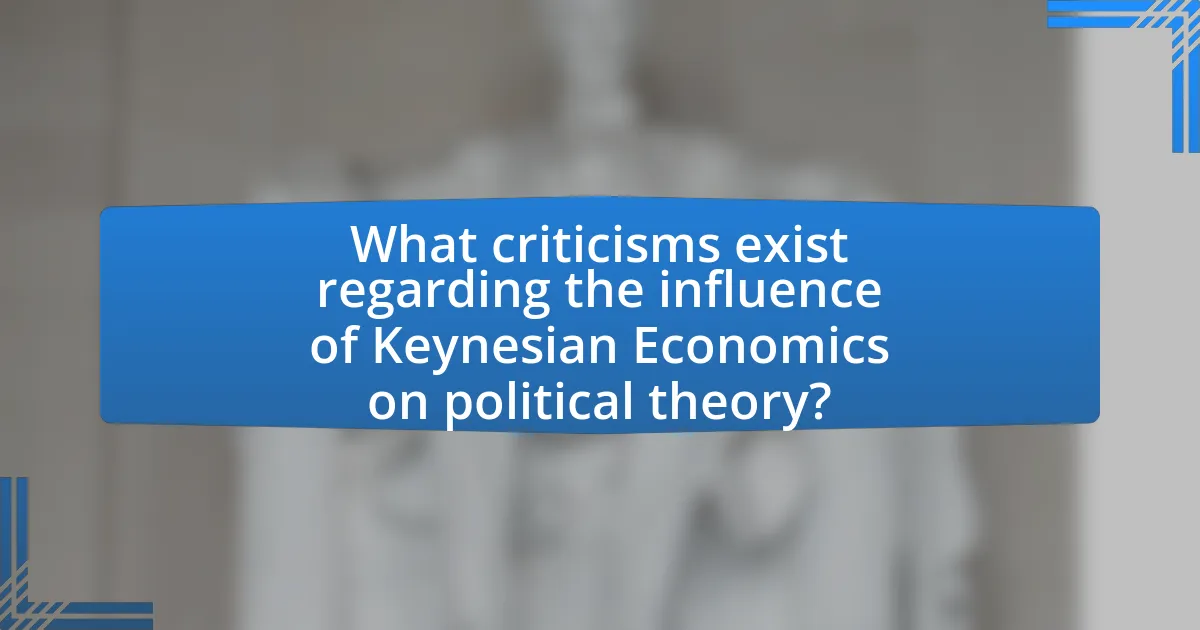
What criticisms exist regarding the influence of Keynesian Economics on political theory?
Criticisms regarding the influence of Keynesian Economics on political theory primarily focus on its perceived promotion of government intervention and the potential for fostering dependency on state support. Critics argue that Keynesian policies can lead to excessive government spending, which may result in budget deficits and long-term economic instability. Additionally, some political theorists contend that Keynesianism undermines individual responsibility by encouraging reliance on state welfare systems, thus diminishing personal initiative and entrepreneurship. Historical examples, such as the stagflation of the 1970s, are often cited to illustrate the limitations of Keynesian approaches, as they failed to address inflation while unemployment remained high, challenging the effectiveness of Keynesian prescriptions in certain economic contexts.
What are the main arguments against Keynesian Economics in political discourse?
The main arguments against Keynesian Economics in political discourse include concerns about government intervention, inflation, and long-term economic growth. Critics argue that excessive government spending can lead to inefficiencies and misallocation of resources, undermining market mechanisms. Additionally, opponents highlight that Keynesian policies may result in inflationary pressures, as seen in the 1970s stagflation, where high inflation coexisted with high unemployment. Furthermore, some economists contend that Keynesian approaches prioritize short-term fixes over sustainable growth, potentially leading to increased public debt and future economic instability. These arguments are often supported by historical examples and economic data that illustrate the limitations of Keynesian strategies in addressing complex economic challenges.
How do critics view the effectiveness of Keynesian policies in economic crises?
Critics often view Keynesian policies as ineffective during economic crises, arguing that such interventions can lead to increased government debt and inflation without achieving sustainable economic growth. For instance, during the 2008 financial crisis, some economists contended that stimulus measures failed to produce the desired recovery, citing slow GDP growth and persistent unemployment rates as evidence. Additionally, critics like Friedrich Hayek have argued that government intervention distorts market signals, leading to misallocation of resources and ultimately hindering long-term economic stability.
What alternative economic theories challenge Keynesian perspectives?
Alternative economic theories that challenge Keynesian perspectives include Monetarism, Austrian Economics, and Supply-Side Economics. Monetarism, primarily associated with Milton Friedman, argues that variations in the money supply have major influences on national output in the short run and on the price level over longer periods, contradicting Keynesian emphasis on fiscal policy. Austrian Economics, represented by figures like Friedrich Hayek, emphasizes the importance of individual choice and market processes, asserting that government intervention distorts economic signals and leads to inefficiencies, which opposes Keynesian advocacy for active government involvement in managing economic cycles. Supply-Side Economics, popularized in the 1980s, posits that lower taxes and deregulation stimulate production and economic growth, challenging the Keynesian focus on demand-side solutions to economic issues. Each of these theories presents a distinct critique of Keynesian economics, advocating for different mechanisms to achieve economic stability and growth.
How do contemporary political movements reflect the legacy of Keynesian Economics?
Contemporary political movements reflect the legacy of Keynesian Economics through their emphasis on government intervention in the economy to promote social welfare and economic stability. For instance, movements advocating for universal healthcare and increased public spending on infrastructure align with Keynesian principles that prioritize aggregate demand as a driver of economic growth. The 2008 financial crisis reignited interest in Keynesian policies, leading to stimulus packages in various countries, such as the American Recovery and Reinvestment Act of 2009, which aimed to boost employment and consumer spending. This resurgence illustrates how political movements today leverage Keynesian ideas to address economic inequality and promote fiscal policies that support public investment, thereby demonstrating the enduring influence of Keynesian Economics on modern political discourse.
What examples illustrate the resurgence of Keynesian ideas in modern politics?
The resurgence of Keynesian ideas in modern politics is illustrated by the economic policies implemented in response to the COVID-19 pandemic, particularly in the United States and Europe. For instance, the American Rescue Plan Act of 2021, which allocated $1.9 trillion for direct payments to individuals, extended unemployment benefits, and support for businesses, reflects Keynesian principles of government intervention to stimulate demand during economic downturns. Similarly, the European Union’s Next Generation EU recovery fund, amounting to €750 billion, aims to support member states through investments and reforms, emphasizing fiscal stimulus to boost economic recovery. These examples demonstrate a renewed emphasis on active government roles in managing economic cycles, aligning with Keynesian thought that advocates for increased public spending during recessions to foster growth and employment.
How do grassroots movements incorporate Keynesian principles in their agendas?
Grassroots movements incorporate Keynesian principles by advocating for government intervention in the economy to promote social welfare and reduce inequality. These movements often emphasize the need for fiscal policies that stimulate demand, such as increased public spending on infrastructure, education, and healthcare, which align with Keynesian ideas that advocate for active government roles during economic downturns. For instance, movements like the Fight for $15 campaign push for higher minimum wages, reflecting Keynesian beliefs that increased consumer spending can drive economic growth. Additionally, grassroots organizations frequently mobilize around policies that aim to redistribute wealth, such as progressive taxation, which is consistent with Keynesian principles that support government action to mitigate economic disparities.
What practical implications does the influence of Keynesian Economics have for policymakers today?
The influence of Keynesian Economics on policymakers today emphasizes the importance of government intervention in stabilizing the economy during downturns. Policymakers utilize Keynesian principles to justify fiscal stimulus measures, such as increased government spending and tax cuts, to boost aggregate demand and mitigate unemployment during economic recessions. For instance, during the 2008 financial crisis, many governments implemented stimulus packages based on Keynesian theory, which led to a significant recovery in economic activity. This approach is supported by empirical evidence showing that economies with active fiscal policies tend to recover faster from recessions, as seen in the post-crisis recovery of the United States, where GDP growth rebounded following substantial government intervention.
How can policymakers effectively apply Keynesian principles in current economic challenges?
Policymakers can effectively apply Keynesian principles in current economic challenges by increasing government spending to stimulate demand during economic downturns. This approach is supported by historical evidence, such as the response to the 2008 financial crisis, where countries like the United States implemented stimulus packages that led to a significant reduction in unemployment rates and economic recovery. Additionally, targeted fiscal policies, such as infrastructure investment and social welfare programs, can enhance consumer confidence and spending, further driving economic growth. The effectiveness of these measures is reinforced by the Keynesian theory that emphasizes the role of aggregate demand in influencing economic activity.
What best practices can be derived from the integration of Keynesian Economics into political strategies?
The best practices derived from the integration of Keynesian Economics into political strategies include proactive fiscal policies, counter-cyclical government spending, and targeted social welfare programs. Proactive fiscal policies advocate for government intervention during economic downturns to stimulate demand, as evidenced by the New Deal programs implemented in the United States during the Great Depression, which significantly reduced unemployment and spurred economic recovery. Counter-cyclical government spending involves increasing public expenditure during recessions and reducing it during booms, a strategy that has been shown to stabilize economic fluctuations and promote sustainable growth. Additionally, targeted social welfare programs, such as unemployment benefits and food assistance, can mitigate the adverse effects of economic downturns on vulnerable populations, thereby fostering social stability and economic resilience. These practices are supported by empirical evidence from various countries that have successfully employed Keynesian principles to navigate economic challenges.
